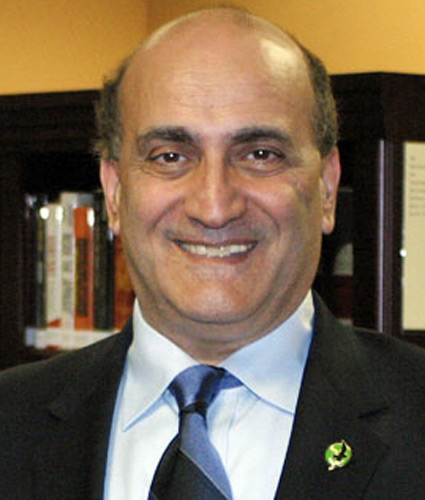Although the Weekly Standard has taken the militant background of Mitt Romney’s Middle East Policy Adviser Walid Phares a little more seriously than National Review, it nonetheless feels the need to draw a false equivalence between Phares and President Barack Obama’s former University of Chicago colleague Rashid Khalidi:
Barack Obama and Columbia University professor Rashid Khalidi both taught at the University of Chicago in the ’90s, and at a farewell dinner for Khalidi in 2003, Obama warmly praised Khalidi’s advice, which took the form of “consistent reminders to me of my own blind spots and my own biases.” Since the Los Angeles Times never released its videotape of the event, we may never know Obama’s blind spots or the enlightenment on offer from his friend and colleague Khalidi?—?a PLO spokesman in Beirut during the Lebanese civil wars.
The Standard attacks former CIA Official Paul Pillar, quoted in my piece, for not acknowledging Khalidi when he told me that he could not “think of any earlier instance of a [possible presidential] adviser having held a comparable formal position with a foreign organization.” The unsigned Standard editorial then absurdly goes on to criticize Pillar for erasing Khalidi from his memory. The problem is that Phares not only has an official position as an adviser to the Romney campaign but also, according to one of Phares’ longtime associates, was promised a high-level job making policy in the Middle East should Romney become president. Neither the Romney campaign nor Phares’ defender Mario Loyola chose to dispute that account.
The Weekly Standard, meanwhile, can’t say that Khalidi and Obama were ever more than friends. Khalidi never held any sort of official position with the Obama campaign, and Obama’s policy towards Israel has been as consistently one-sided as previous American presidents. It’s as though the Standard couldn’t bring itself to acknowledge Phares’ problematic background without also taking a completely gratuitous shot at the Obama administration for the crime of being friends with someone with pro-Palestinian views and indulging in a little random score-settling with Pillar for past criticism of the Bush administration.
The editorial unintentionally reinforces the double-standard at play here. Phares’ militant past and official role as a Romney adviser draws the most mild of rebukes, while Obama’s friendly relationship with Khalidi provokes hysterical speculation about Obama’s “true feelings” about Israel and Palestine, as though he doesn’t have an actual record on the issue to evaluate. Observe the Standard‘s consternation over Obama’s friendship with Khalidi, and try to imagine the teeth-gnashing rage towards Obama from conservatives had he actually appointed an adviser who played a role in PLO comparable to the one Phares played in the Lebanese Forces during Lebanon’s civil war.














